
Poker Etiquette: Do’s and Don’ts at the Table
Playing poker is not just about mastering the rules of the game; it’s also about understanding and adhering to the etiquette that governs behaviour at the table. Whether you are a novice or an experienced player, observing proper poker etiquette is essential to maintain the integrity of the game and ensure a positive experience for all participants. This guide covers the fundamental do’s and don’ts that every poker player should follow.
Respect the Game and Other Players
Respect is a cornerstone of poker etiquette. From the moment you take your seat at the table, it is important to show consideration for both the game and your fellow players. This includes arriving on time for your game, paying attention when it’s your turn, and refraining from distracting behaviours such as excessive talking or using your phone. The poker table is a place for serious play, and it is expected that all participants conduct themselves with a level of professionalism.
Another aspect of respect involves understanding and following the house rules. Every poker room may have slight variations in rules, so it’s important to familiarize yourself with them before you start playing. By respecting these rules and the dealer’s authority, you help maintain a smooth and fair game. Remember, poker is as much about mental discipline as it is about strategy; respecting the game and the players is a crucial part of this discipline.
Act in Turn and Avoid Slow Play
Acting out of turn is one of the most common breaches of poker etiquette and can disrupt the flow of the game. Each player must wait until it is their turn to act, which ensures that everyone has a fair chance to make their decisions based on the actions of others. Acting out of turn not only gives away information prematurely but can also be seen as disrespectful to other players. Always be aware of the order of play and act accordingly.
In addition to acting in turn, avoiding slow play is equally important. While it’s understandable to take time for making decisions, especially in high-stakes situations, consistently playing slowly can frustrate other players and slow down the pace of the game. If you find yourself in a situation where you need extra time, a quick explanation to the table can help alleviate any tension. However, habitual slow play is frowned upon and should be avoided. The goal is to keep the game moving at a reasonable pace for everyone involved.
Avoid Discussing Hands in Play
One of the golden rules of poker etiquette is to avoid discussing hands that are still in play. Talking about a hand while it is ongoing can inadvertently give away information, influencing the decisions of the players involved. This includes both discussing your hand and speculating about others’ hands. Even casual comments can be misinterpreted and may lead to unfair advantages or disadvantages.
Once a hand is complete, it’s generally acceptable to discuss it, but even then, it’s important to do so respectfully. Criticizing others’ play or offering unsolicited advice can be seen as poor etiquette. The focus should always be on maintaining a positive and respectful atmosphere at the table.
By keeping your thoughts on the current hand to yourself, you ensure that the game is fair and enjoyable for all participants. This is especially important in a live poker setting, where facial expressions and body language are part of the game.
Handle Chips and Cards Properly
The way you handle your chips and cards at the poker table is another critical aspect of poker etiquette. Fumbling with your chips or cards can not only slow down the game but can also create suspicion among other players. Always handle your chips and cards with care, keeping your actions clear and deliberate. This helps to avoid any confusion or misunderstandings during the game.
When placing bets, make sure your chips are clearly visible and stacked neatly. This ensures that other players and the dealer can easily see and count your bet, which helps maintain the pace and fairness of the game. Similarly, when it comes to handling your cards, avoid showing them to other players or the dealer unless required. Protecting your hand is your responsibility, and it’s essential to keep your cards secure and hidden from view.
In addition, never splash the pot when making a bet or call. This refers to throwing chips haphazardly into the pot, which makes it difficult for the dealer to accurately determine the total bet. Instead, place your chips in front of you in a clear, organized manner. Proper handling of chips and cards reflects your respect for the game and other players.
Keep Your Emotions in Check
Poker is a game of skill, strategy, and patience, and it is important to keep your emotions in check at all times. Outbursts, whether in the form of anger, frustration, or excessive celebration, are considered poor poker etiquette. Such behaviour can be disruptive to other players and can also give away information about your hand. Maintaining a calm and composed demeanour is key to being a respected player.
If you lose a hand, accept it graciously and avoid blaming others or making excuses. Similarly, if you win, be humble and avoid gloating. Respecting the outcome of each hand, regardless of whether you win or lose, is an important part of poker etiquette. Remember, every player at the table is there to enjoy the game, and keeping your emotions in check helps to ensure that everyone has a positive experience.

Don’t Engage in Chip Dumping or Collusion
Chip dumping and collusion are serious violations of poker etiquette and can lead to severe consequences, including being banned from the game. Chip dumping involves deliberately losing chips to another player to help them gain an advantage, while collusion refers to two or more players working together to cheat the rest of the table. Both practices are considered unethical and are strictly prohibited in any poker setting.
To maintain the integrity of the game, it is crucial that all players act independently and avoid any form of cheating. If you suspect that chip dumping or collusion is taking place, it’s important to report it to the dealer or floor staff immediately. Upholding the rules and maintaining a fair playing environment is the responsibility of every player at the table.
By avoiding these unethical practices and playing with honesty and integrity, you contribute to a positive and fair poker experience for everyone involved.
Know When to Leave the Table
Knowing when to leave the table is as important as knowing how to play the game. Whether you’re ahead or behind, it’s important to recognize the right time to cash out and leave the game. Lingering at the table after you’ve decided to stop playing can be disruptive to others and is generally considered poor etiquette. If you’ve had a good run or if you’re experiencing a losing streak, gracefully bowing out is the mark of a seasoned player.
When leaving the table, do so quietly and without causing a scene. Make sure to thank the dealer and the other players, as a gesture of respect for the game and its participants. If you plan to return to the same game later, it’s courteous to inform the dealer and other players of your intentions. Leaving the table at the right time and in the right manner helps maintain the flow of the game and shows respect for everyone involved.
By following these poker etiquette guidelines, you not only enhance your own playing experience but also contribute to a respectful and enjoyable atmosphere at the table. Remember, poker is as much about behaviour as it is about skill, and observing proper etiquette is a sign of a true poker professional.

